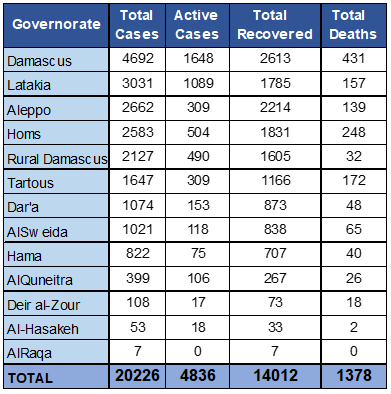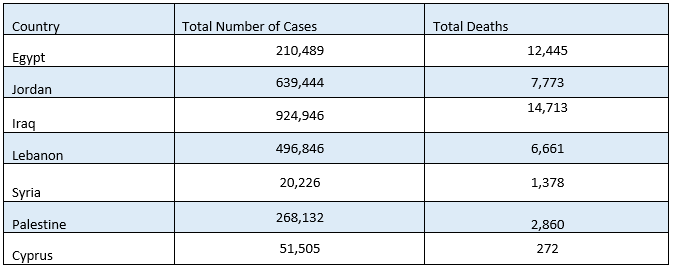MECC Coronavirus (COVID 19) Weekly Report
SYRIA: COVID-19
Humanitarian Update No. 55
Reporting period: from 4 to 11 April 2021
Coronavirus cases: 20226 Active cases: 4836 Recovered: 14012 Deaths: 1378 [1]
Highlights
In GoS-controlled areas of the country, (as of 11 Apr), the Syrian Ministry of Health (MoH) reported 20226 Laboratory-confirmed cases, 1378 fatalities, and 14012 Recoveries.
20226 laboratory-confirmed cases have been reported by the Syrian MoH : 4692 in Damascus; 3031 in Lattakia; 2662 in Aleppo; 2583 in Homs; 2127 in Rural Damascus; 1647 in Tartous; 1074 in Dar’a; 1021 in Sweida; 822 in Hama; 399 in Quneitra; 108 in Deir-Ez-Zor; 53 in Al-Hasakeh and 7 in Ar-Raqqa.
The MoH has also reported 691 healthcare workers have tested positive for COVID-19 including 30 who have sadly died.
Since reopening in September, as of 25 March, 2,534 COVID-19 cases have been reported schools; including at least 22
reported deaths. Of these, 961 were reported to be students and 1,573 teachers/administrative staff.As of 4 April, authorities in Northeast Syria (NES) have reported at least 10,509 cases, including 450 fatalities and 2,240 recoveries. Healthcare workers have also been affected, with 822 reported cases to date.
In NES, in response to rising cases, from 3 April local authorities announced a partial curfew from 6 p.m. to 6 a.m. from 6 to 12 April. All restaurants, cafes, schools, universities and institutions must also close, although essential shops, groceries and services can remain open. Mass social gatherings are prohibited, and public collective prayers are suspended.
Preparedness and response
The revised 2021 plan, including the response monitoring framework was disseminated.
In the reporting period, UNICEF reported ongoing regional outreach, including awareness raising sessions integrated with infant and young children feeding in health facilities and hygiene promotion in schools.
UNFPA reported reaching over 38,000 people with COVID-19 related activities in the reporting period, including awareness raising through the integrated GBV/RH mobile teams, community wellbeing centers and women and girls’ safe spaces. This included awareness raising reaching more than 11,000 through partners in Aleppo in the reporting period, and targeted awareness raising for 158 young people in Damascus.
Around 61,973 people were reached with COVID-19 awareness raising, with most conducted virtually, with exceptional in-person visits for the most vulnerable individuals and unaccompanied persons.
OXFAM delivered awareness sessions in ten schools in Rural Damascus reaching over 2,600 students in addition to supporting 91 volunteers delivering awareness-raising messages and IEC on surface hygiene measures for shops and traders. OXFAM also supported 88 female workers to disseminate COVID-19 prevention key messages in DeirEz-Zor and Aleppo for 60 days. IMC continued support of awareness sessions in Damascus, Rural Damascus and Dar’a utilizing 11 health educators.
WHO supported two field visits to Homs and Tartous to review the capacity at three groundcrossing PoEs and at three ports (Tartous, Baniyas and Alwad). WHO further supported two workshops for 40 people on enhancing PoE preparedness and response capacity, based on the IAR recommendations, as well as the updated COVID- 19 case definition.
WHO supported further training in molecular biology, COVID-19 PCR testing, biosafety, and biosecurity procedures for nine laboratory technicians from Ar-Raqqa and Deir-Ez-Zor.
In the reporting period, WHO delivered three new PCR machines for laboratories in Tartous, Rural Damascus and As-Sweida. In addition, UNHCR has procured one GeneXpert machine, and WHO delivered another GeneXpert to the Qamishli National Hospital, which has been functional since the end of December. A public health laboratory in Hama has been equipped with support from the Aga Khan Development Network and is expected to start functioning shortly.
WHO dispatched nearly 33,000 PPE items to health facility partners in Damascus, Al-Hasakeh, Deir-Ez-Zor, Ar-Raqqa and Aleppo, in addition to 29 infrared thermometer devices.
During the reporting period, UNICEF supported training for 75 heath workers from nursing schools on IPC measures during COVID-19, in addition to delivering 150,000 PPE (N95 masks and gowns) and 50,000 hand sanitizers to education partners and nearly 300,000 PPE (N95 masks, gowns and gloves) and 29,060 hand sanitizers to health partners in seven governorates. Also,UNICEF completed rehabilitation of WASH facilities at a Damascus hospital, and continued rehabilitation of WASH facilities and sewage networks at the Al Forat Hospital and Children and Obstetrics Hospital in Deir-Ez-Zor.
During the reporting period,UNDP completed rehabilitation at additional healthcare facilities in Lattakia and Dar’a, with work in Deir-Ez-Zor ongoing and 85 per cent completed to date.
UNDP further continues support of safe water supplies in Al-Hasakeh, including rehabilitation of seven pumping stations and 26 wells completed in January 2021. Other light rehabilitation, including WASH, by Première Urgence Internationale (PUI) and Medair, in Deir-Ez-Zor, Dar'a, Quneitra, Idleb and Aleppo has been completed, as per earlier reports.
In the reporting period, WHO supported training for 150 health workers including on immediate life support and ventilator management in Damascus, Aleppo, Rural Damascus and Hama. Further, WHO provided more than 71,000 treatments of lifesaving medicines to partners including for COVID-19 cases.
The Logistics Cluster facilitated the transportation of 3MT of Health Sector cargo by air from Damascus to Qamishli. This is in addition to an UNHAS service for air passengers between Damascus and Qamishli. During the reporting period, the UNHAS service expanded to include twice-weekly flights to Aleppo.
UNICEF also reported in the reporting period, in addition to ongoing RCCE campaigns in Al-Hol camp, COVID-19
awareness and vaccine demand generation promotion activities reached 1,661 people through 65 volunteers in Al-Hasakeh and Ar-Raqqa, including in IDP camps.
Vaccines
Weekly operational calls on NES are ongoing, including on assessing coverage and gaps in camps, as well as COVAX planning. Joint calls are arranged with NES Forum INGOs to address the COVID-19 response in NES camps.
On 25 March, the COVAX facility informed participating Member States that deliveries of doses from the Serum Institute of India would be delayed in March and April due to increased demand for COVID-19 vaccines in India, affecting 37 low and middle-income countries, including Syria.
An anticipated delivery of 912,000 doses are now expected to arrive in Syria sometime around May with exact timing to be confirmed; the COVAX team are exploring possible other channels.
Estimated operational costs for the first phase of the COVAX roll-out are US $7 million ($4.5 million for GoS areas and NES, and $2.5 million for north-west Syria).1 Additional funds of $101 million are required to cover operational costs for the remaining 50 per cent of the population required to reach 70 per cent coverage to achieve herd immunity. Of note, COVAX has only currently committed to supply the vaccine for the priority 20 per cent.[2]
[1] Microsoft power MOH,10 Apr 2021
[2] OCHA, SYRIAN ARAB REPUBLIC: COVID-19Humanitarian Update No. 25 As of 5 April 2021
Lebanon: COVID-19
Humanitarian Update No. 52
Reporting period: from 7 to 12 2021
Coronavirus cases: 496,846 Deaths: 6,661 Recovered: 402,172
Highlights
Corona related stats, source: WHO
Minister Hamad Hassan in a meeting with the Director of the Levant Department at the World Bank. March 8, 2021, photo credit: mops.gov.lb
During this reporting period, the average number of cases dropped to 2882.
The government imposed lockdown measures during the Ramadan period in Lebanon.
Due to a Covid-19 surge in Lebanon, the country will be implementing a curfew from 9:30pm to 5:00am starting Monday, April 12, throughout the month of Ramadan, to avoid large gatherings.
Restaurants will be open at 50 per cent capacity throughout the day. Delivery is allowed 24/7.
Since 01/14/2021, 45,261 minutes have been written against violators of the closure decisions
The Minister of Public Health in the caretaker government, Dr. Hamad Hassan, held a meeting in his office at the ministry with the Director of the Levant Department at the World Bank, Saruj Kumar, during which the previous stage of cooperation, the national plan for vaccination, and the sources of vaccines were evaluated.
The Minister of Public Health communicated with the Minister of Information and revealed a donation of the Chinese Sinopharm vaccine, which will be allocated to media professionals, the army and employees.
His Eminence, the Grand Mufti of the Republic, Sheikh Abd al-Latif Derian, issued a ruling allowing Muslims to use PCR tests and take vaccines during the fasting period.
Communication and Public Relations Department




